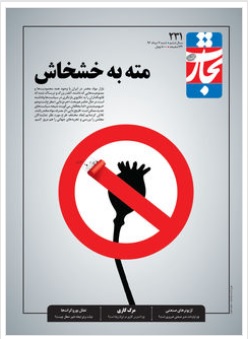 On the occasion of the oath-in of President Hassan Rouhani for the 2nd term of his presidency, The Persian weekly “Tejarate-e Farda” journal, has compiled the views of some Iranian alive and passed away officials over the years on socialism.
On the occasion of the oath-in of President Hassan Rouhani for the 2nd term of his presidency, The Persian weekly “Tejarate-e Farda” journal, has compiled the views of some Iranian alive and passed away officials over the years on socialism.
Starting by the Parliament Speaker, “Ali Larijani”, who presented shocking figures on Iran’s economic freedom at Iran’s Medical Universities’ Boards of Trustees Conference in late July, the weekly economical journal summarized the influence of the former Soviet Union, Russia and socialism over the economy of Iran since years.
Figures that shocked many
Iran ranks 22nd out of 22 regional countries and 174th out of 181 countries when it comes to economic freedom, Mr. Larijani said to the board and added: “Iran comes in 10th among 24 regional countries and 84th among 191 countries in the world, GDP-wise”
“In terms of share of foreign investment in GDP, Iran ranks 22nd out of 24 countries in the Middle East and 162nd out of 181 countries” Larijani said, blaming the dominance of socialist public ownership over the past four decades despite the mandates of Article 44 of the Constitution, which divides the economic system into three main sectors: public, cooperative and private sectors.
A major step toward privatization was taken in 2004 when the Expediency Council offered a new interpretation of Article 44 and the Supreme Leader Ayatollah Seyyed Ali Khamenei approved the new interpretation. The article obliged the government to bestow all but those activities included in it, to the public non-state, private and cooperative sectors.
In terms of the government’s ownership of organizations and its obligations toward privatization, the law has provisioned three groups of state-owned enterprises, the government has been prevented from ownership, investment and managerial rights in Group 1 organizations, it is obliged to transfer 80% of the total value of Group 2 organizations to private, cooperative and public nongovernmental organizations, while ownership, investment and managerial affairs of Group 3 organizations is exclusive to the government.
Failed Privatization
Two years ago, at a business breakfast, the Minister of Roads and Urban Development Abbas Akhoundi said: “Socialism has deep roots in Iran’s economy so that even the private sector did not remain unaffected. The private sector have delegated the right of pricing to the government in return for subsidies”
“Iran has never had a market economy; what was advertised as privatization of industries is a joke. If privatization is real in Iran, why do resources get allocated via bureaucracy? Why are there no bankruptcies? Why are large corporations’ hands in government coffers?” Akhoundi said.
“Since 30-odd years ago, those who were mainly influenced by Marxism argued that Islam’s economic system is a socialist one”. Such a mindset led to the nationalization of domestic manufacturing companies, factories and banks, which consequently made Iran’s economy bereft of efficiency, innovation and entrepreneurship” He added.
Rightist Approach
Yahya Al-e Es’haq, who is known for his rightist approach and the former chairman of Tehran Chamber of Commerce, Industries, Mines and Agriculture, once told the a daily newspaper that: “The economic plans of the early years of revolution copied the laws of the communist countries”.
Soviet Influence
An early leftist figure in the revolutionary days, and by now the first Vice President, Es’haq Jahangiri, says: “Iranians have been influenced by communism due to the country’s proximity to the Soviet Union. “We were willing to defend the oppressed and trying to find signs that Islam is the defender of the poor and opposes capitalism. Such a mentality was reflected in all economic policies and constitution of Iran”
The former MP, who is a staunch advocate of free market today, says, “Post-revolution, no one saw such moves as anti-development. You were not allowed to talk of certain terms, including ‘foreign investment’ or ‘private sector'”.
President’s Blames
As the President Hassan Rouhani has time and again talked of allowing the private sector to lead the way and backs foreign investment and free market economy.
“Since day one, I have warned against command economy and believe that the government must allow economic players to take the initiative,” he said.
Back in June, during a meeting with economic stakeholders, the President renewed his pledge to follow through reform plans to revamp the poorly privatized economy, noting that the government has been committed to handing over the economy to the private sector since taking office in 2013.
He blamed the problems of private sector on his predecessor’s inefficiency and poor management in enforcing Article 44 of the Constitution.
“The Leader of Islamic Revolution has stressed that the economy be effectively handed over to the public. If the policies of Article 44 had been properly implemented, the economy would have been revolutionized” he said.












